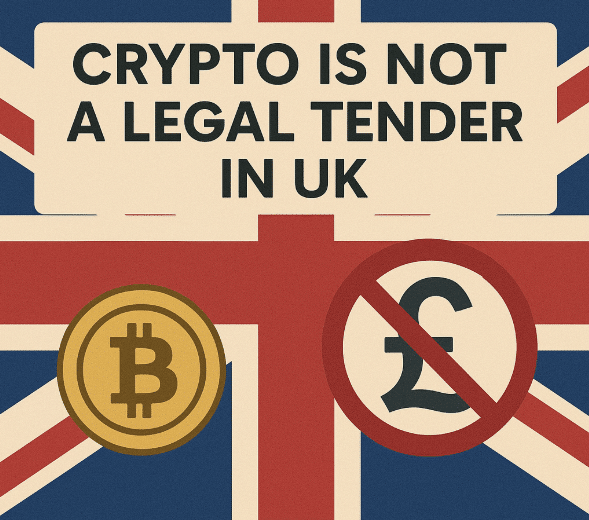Cryptocurrency is legal in the United Kingdom, though it’s not recognized as legal tender. The UK has established a progressive regulatory framework that balances innovation with consumer protection.
This guide explores the UK’s crypto regulations, compliance requirements, and recent developments shaping the country’s approach to digital assets in 2025.
Cryptocurrency Laws in the UK – Is it Legal?
Cryptocurrency is completely legal to buy, sell, and hold in the United Kingdom, similar to crypto regulations in the United States.

The UK has responded to digital currencies with targeted regulations designed to prevent money laundering and terrorism financing while supporting legitimate use.
Regulatory Framework
The Financial Conduct Authority (FCA) is the main regulator for crypto assets in the UK. It ensures that crypto providers implement effective AML/CFT policies and maintain a register of compliant businesses. Other key institutions include HM Treasury and the Bank of England.
Crypto companies must comply with:
- Money Laundering Regulations (MLR) 2017 – Outlines AML requirements and registration procedures
- Financial Services and Markets Act 2000/2023 – Applies to certain crypto asset types
- Electronic Money Regulations 2011 – May apply depending on the business model
The FCA has banned the sale of crypto derivatives to retail consumers since January 2021, though this restriction doesn’t affect direct cryptocurrency purchases.
Who Needs to Register?
Two main types of entities require registration:
- Crypto asset service providers – Companies that exchange crypto for money (or vice versa), exchange different cryptocurrencies, or operate crypto ATMs
- Custodian wallet providers – Businesses that safeguard crypto assets or private keys on behalf of customers
Companies dealing with security tokens must register with the FCA, while those marketing crypto services to UK consumers are also subject to registration requirements. Registration decisions consider factors like business activities, UK presence, and customer targeting.
Are Crypto Assets Legal Tender in the UK?
While cryptocurrencies are legal, they aren’t legal tender in the UK. Only the pound sterling holds this status, meaning no one is obligated to accept crypto as payment.

Businesses can choose to accept cryptocurrency payments, but they’re not required to do so.
AML Requirements
Compliance with Anti-Money Laundering regulations is mandatory for crypto businesses. Key requirements include:
- Appointing a Money Laundering Reporting Officer
- Implementing staff training programs
- Conducting risk assessments
- Performing Customer Due Diligence (CDD)
- Screening for Sanctioned Individuals and Politically Exposed Persons
- Monitoring transactions and customer behavior
- Maintaining records for at least five years
- Reporting suspicious activity to authorities
During customer onboarding, businesses must verify basic information, including full name, birth date, and address, typically using government-issued documents.
UK Crypto Travel Rule
The UK has implemented the Travel Rule through the Money Laundering and Terrorist Financing (Amendment) (No. 2) Regulation 2022. This requires crypto companies to obtain and share information about transaction originators and beneficiaries with other service providers. Unlike some jurisdictions, the UK doesn’t specify a minimum threshold, meaning information must be transferred regardless of transaction amount.
UK Crypto Tax Implications
Cryptocurrency taxation in the UK varies between individuals and businesses:
For individuals:
- Capital gains tax applies to profits from trading
- Tax obligations extend to mining and staking activities
For businesses:
- Potential liabilities include capital gains, corporation tax, income tax, national insurance contributions, stamp duty, and value-added tax
HM Revenue & Customs (HMRC) treats cryptocurrencies as commodities, applying barter transaction rules to crypto transactions. Record-keeping is essential, as the tax authority requires reporting of gains and losses. The UK also allows for the deduction of certain allowable costs in case of losses.
Future of Crypto and Blockchain in the UK
The UK is actively developing its approach to cryptocurrency regulation with several significant initiatives:
Property (Digital Assets) Bill
Introduced in Parliament on September 11, 2024, this landmark legislation will formally recognize digital assets (including cryptocurrencies and NFTs) as personal property under English and Welsh law. This provides legal clarity that was previously lacking and offers greater protection for digital asset owners against fraud and scams in crypto.
The bill represents a significant step in positioning the UK as a leader in the global crypto industry, with similar measures being considered in Scotland and Northern Ireland.
Expanding Regulatory Scope
The UK government announced plans in February 2023 to:
- Strengthen rules for crypto trading platforms
- Create a regulatory framework for crypto lending
- Implement protections against market manipulation
- Develop comprehensive regulations for stablecoins
Central Bank Digital Currency
The Bank of England is exploring a potential Central Bank Digital Currency (CBDC), unofficially dubbed “Britcoin.” This would potentially allow consumers and businesses to hold accounts directly with the central bank and facilitate faster payments. While research continues, no decision has been made about implementation.
Risks and Protections
UK crypto users should be aware of several risks:
- No Deposit Insurance – Crypto assets aren’t protected by the Financial Services Compensation Scheme
- Market Volatility – Cryptocurrency values can fluctuate dramatically
- Limited Regulatory Protection – Consumer safeguards aren’t as comprehensive as with traditional financial products
- Cybersecurity Threats – Exchange hacks and wallet vulnerabilities remain concerns
Suggested Posts:
Conclusion: Crypto is legal in the United Kingdom
The UK has established a balanced approach to cryptocurrency regulation that recognizes the innovation potential while addressing risks through targeted requirements. The legal status of cryptocurrencies is increasingly clear through initiatives like the Property (Digital Assets) Bill, though they remain distinct from legal tender.
For cryptocurrency users and businesses, compliance with FCA registration and AML requirements is essential. The regulatory landscape continues to evolve, with new frameworks for stablecoins, lending platforms, and consumer protection being developed.
As the UK refines its approach to digital assets, it aims to maintain its position as a global financial center while providing greater clarity and security for participants in the crypto economy.
FAQs
The Financial Conduct Authority (FCA) oversees crypto asset providers, particularly regarding AML requirements.
Registration is required for businesses dealing with security tokens or marketing crypto services to UK consumers.
Individuals pay capital gains tax on profits, while businesses face various tax obligations including corporation tax and VAT.
Legislation introduced in 2024 that formally recognizes cryptocurrencies and other digital assets as property under English and Welsh law.

![Crypto Tax Free Countries In 2025 [Updated List]](https://crypto.prosperityforamerica.org/wp-content/uploads/2025/03/Crypto-Tax-Free-Countries-1-1024x536.png)

![Top 15 Crypto Podcasts to Listen to in 2025 [Popular]](https://crypto.prosperityforamerica.org/wp-content/uploads/2025/03/Best-Podcasts-on-Cryptocurrency-1024x536.png)



